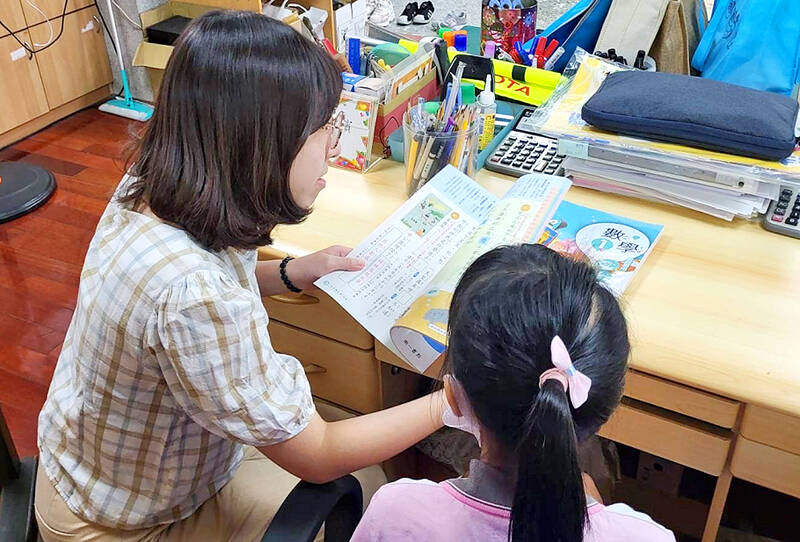China Development Foundation is promoting the “Heritage 100 x Tutoring 100” Program to financially assist outstanding college students and encourage them to become tutors for economically disadvantaged schoolchildren in Taiwan. This program has supported over 1,700 students in the past 17 years. Recently, the foundation held an online volunteering workshop, where this year’s 100 scholarship recipients pledged to work together with love, patience, and tolerance to assist schoolchildren for 100 hours of tutoring sessions.
The “Heritage 100 x Tutoring 100” Program was established with the strong support of Angelo J. Y. Koo, the chairman of the China Development Foundation, to encourage college students to accompany disadvantaged schoolchildren in their growth. Volunteers who share similar backgrounds with the disadvantaged children can provide timely assistance and understand their needs. Since its implementation, a total of NT$84 million has been invested, and about 1,700 college students have participated in the volunteering program, benefiting more than 1,700 schoolchildren and families.
Luo, a student at the graduate school of Chung Cheng University, has received the scholarship for five consecutive years due to her outstanding performance in tutoring. One day, Luo met a younger student whom she had tutored before. The little girl said, “Sister, you used to remind me to concentrate on my studies and do my homework obediently after class. I have done it all now!” This simple sentence deeply moved Luo. She said that through interacting with the students, she has developed empathy and learned to think from their perspectives. Another student named Dai, who has just received a scholarship for the first time at Taipei University, is looking forward to becoming a volunteer tutor. “Looking back on my growth process, receiving help and encouragement from others gave me the courage to face the future. Now that I have the ability, I also want to be a person who gives strength to others,” Dai said.

Photo courtesy of China Development Foundation
Angelo J. Y. Koo firmly believes that “education is the best investment.” For 17 years, through this program, the volunteers have not only helped disadvantaged students improve their learning confidence but also had the opportunity to give back to society. The foundation will continue to be involved in disadvantaged education, assisting students in finding their academic direction and helping them to grow happily with the support and companionship of love. The Foundation hopes that college students who are interested in giving back will join as tutoring volunteers so that more disadvantaged children can benefit, expanding the cycle of kindness and working together to spread love and warmth.

Intel Corp chief executive officer Lip-Bu Tan (陳立武) is expected to meet with Taiwanese suppliers next month in conjunction with the opening of the Computex Taipei trade show, supply chain sources said on Monday. The visit, the first for Tan to Taiwan since assuming his new post last month, would be aimed at enhancing Intel’s ties with suppliers in Taiwan as he attempts to help turn around the struggling US chipmaker, the sources said. Tan is to hold a banquet to celebrate Intel’s 40-year presence in Taiwan before Computex opens on May 20 and invite dozens of Taiwanese suppliers to exchange views

Application-specific integrated circuit designer Faraday Technology Corp (智原) yesterday said that although revenue this quarter would decline 30 percent from last quarter, it retained its full-year forecast of revenue growth of 100 percent. The company attributed the quarterly drop to a slowdown in customers’ production of chips using Faraday’s advanced packaging technology. The company is still confident about its revenue growth this year, given its strong “design-win” — or the projects it won to help customers design their chips, Faraday president Steve Wang (王國雍) told an online earnings conference. “The design-win this year is better than we expected. We believe we will win

Chizuko Kimura has become the first female sushi chef in the world to win a Michelin star, fulfilling a promise she made to her dying husband to continue his legacy. The 54-year-old Japanese chef regained the Michelin star her late husband, Shunei Kimura, won three years ago for their Sushi Shunei restaurant in Paris. For Shunei Kimura, the star was a dream come true. However, the joy was short-lived. He died from cancer just three months later in June 2022. He was 65. The following year, the restaurant in the heart of Montmartre lost its star rating. Chizuko Kimura insisted that the new star is still down

While China’s leaders use their economic and political might to fight US President Donald Trump’s trade war “to the end,” its army of social media soldiers are embarking on a more humorous campaign online. Trump’s tariff blitz has seen Washington and Beijing impose eye-watering duties on imports from the other, fanning a standoff between the economic superpowers that has sparked global recession fears and sent markets into a tailspin. Trump says his policy is a response to years of being “ripped off” by other countries and aims to bring manufacturing to the US, forcing companies to employ US workers. However, China’s online warriors